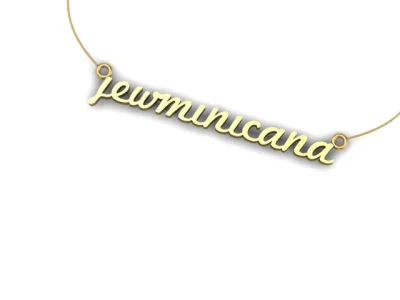“No, really. Where you from?”
“New York!” But I know they’re not really asking which state I hail from. I’ve been under the inquisition enough times to know. Plus, it helps that some people’s curiosity has gotten the best of them and led to questions like:
“Where are your parents from? Where are your grandparents from?” and even “No, where were they from before that?” Excuse me, but what kinds of questions are these from people I’ve just met?
And yet, I’ve always gotten these kinds of questions. Questions that I attribute to features that don’t always peg me as Hispanic but more often biracial (half black/half white). These same features don’t strike many people around the Shabbos (Sabbath) table as “Jewish” in the Eastern European sense. Looking “exotic” tends to make people very curious.
When the news comes up at the Shabbos table, one woman says disdainfully: “Why do they have to sing the national anthem in Spanish? Our national language is English. Everyone should speak English! One language unites us.” She nods, looking around for agreement.
But I, bilingual Spanish-speaking me, respond: “As if those guys on the news didn’t speak English? I mean, they translated the national anthem from English. Maybe, you should stop speaking Hebrew, being all Jewish, because it isn’t very American after all? Or maybe culture and language doesn’t have to DIVIDE us.”
I’ve also been the “racial representative.” Representative for people of color everywhere. But I realize when someone asks, “So, seriously, why do Hispanic women dress like that?” that they really believe I have some magic crystal ball connection that helps me understand all people of color. Long after realizing anger has gotten me nowhere, I’ve tried to change gears, tried to take a second to assume the best in people. They’re not trying to be racist. (Even though, they are.) Sometimes, I say, “How should I know?” But more often than not, I find myself representin’: “People from different cultures have different dress codes” and “So, you think we should all start wearing burkhas (the enveloping outer garment worn by women in some Islamic traditions for the purpose of cloaking the entire body)?” People try to understand different cultures through the lens of their own and too often decide that anything different is “weird.”
Judaism doesn’t want to make people feel “weird” so it’s actually socially unacceptable to ask someone if they converted. If someone converted, they’re Jewish and that’s enough with that. But people will ask indirectly. And though I am a convert, I wonder about all the Jews of color that aren’t. The common assumption is that a person of color can’t have been born a Jew. But we need only look at the rich landscape of colorful Jewish faces in Israel (not to mention America) to see that this assumption is untrue. The best defense again is EDUCATION. “No, sir, as a matter of fact, not every Jew is a bagel and lox eating, pasty-faced, curly-haired neurotic with a big nose! Spread the word!” Okay, so I’m still a little angry.
Unfortunately, the Jewish people are no strangers to racism. They perpetrate it as much as the next guy. Someone asked me: “How could a people who have suffered the Holocaust be so racist?” Because Jews have suffered centuries of anti-Semitism that has created an “us” versus “them” mentality that continues to poison interactions with non-Jews and Jews who don’t fit into cookie cutter boxes for race and ethnicity. I’ve met a half-Asian, half-white girl whose Jewish affiliation became nonexistent after her Hebrew school classmates terrorized her with racially charged attacks. I had an Asian convert tell me that after all the racism he’s endured, he remains tied to Judaism only for his son’s sake.
So as an Orthodox Jew of color, I’m all about…EDUCATION! I educate whoever’s in need: about what it means to be Orthodox, a Jew and a person of color all rolled into one. Sometimes, I educate whether or not the ill-informed are ready to listen. Maybe it’s the former teacher in me but I just can’t allow people to walk around “all ignorant.” And neither should you.


ha – a “racial spy” – that’s pretty amusinggood posting 🙂
LikeLike
Great article Aliza! It will be interesting when I convert to hear people say negative things about Jews, and go on the defensive. I guess I would be a “religious spy.”
LikeLike
I wholeheartedly agree that the American national anthem should <>not<> be sung in Spanish at any time. The national language of the USA is English, and unless we add Spanish as an official language of this country, the anthem should be sung only in English. Making translations available, however, is a good thing, and should not be limited to Spanish. I feel likewise about Hatikva.
LikeLike
Ah, the “religious spy,” good term!
LikeLike
We dealt with these issues with our son. One Shabbat, on the JCC Playground, two very charedi looking children came up to him, ignoring his kippah and talit katan, and on seeing the boy’s dark brown complexion, that bespoke of his Guatemalan origins, told him he wasn’t Jewish. I think I was more devastated by this than he was.When it time was to send him to day school I made it a point of raising the “diversity” issue with the respective principles I met with and I think the school we selected has really made a good effort in embracing him, and other “visible minorities”, as part of their student body and Klal Yisrael. I think also the fact that we attend a Sephardic Bait Knesset has helped him in that our congregation really embodies the entire spectrum of Jewish communities so he sees every Shabbat Jews from many ethnic and national backgrounds. Well as Rudyard Kipling once said, “The more we work and the less we talk the better we shall be!”
LikeLike
I obviously disagree. I don’t find it at all threatening or distasteful to have the national anthem (or any national anthem) sung in another language that is not the national language. I think that having it sung in Spanish or French for that matter is a testament to the melting pot that American has always been. People that are hyphenates–Hispanic American, for instance–are always trying to balance their cultures and I think this was one way of doing that. But Americans, specifically white conservative Americans took offense at the time. Why? Well, it certainly didn’t help that things with immigration were heating up. And a lot of the immigration stuff didn’t just have to do actually legal problems, it had to do with racism. We want to keep people out. We want to make sure that people leave their cultures at the door. This used to be what America stood for: assimilation. I think it could stand for something else: integration, celebration.
LikeLike
the language we use doesn’t matter. the United States of America are not some kind of Old World “nationstate” based on commonality of culture, language or cuisine — it’s a country based solely on IDEOLOGY and IDEALS. you can talk about freedom, liberty and the “american dream” in any language, not just English
LikeLike
Well said, Steg.
LikeLike
Well said, Steg.
LikeLike
Well there are historical examples where “intense diversity” worked very well, notably the Austro-Hungarian Empire, more so in areas administered directly by Vienna in the Dual Monarchy, then Budapest. A century ago it was possible to hear the national anthem “G-d Bless the Emperor” sung in 11 languages across Franz Josef’s round while German, Hungarian, and Czech enjoyed “full” status. I might add that if you go to the website of the South African Broadcasting Corp you can real audio broadcasts in four languages, English, Afrikaans, Zulu, and Xhosa.On the other hand bi-lingualism isn’t working very well in Belguim these days and in the Canadian experience Quebec’s claim to be a “distinct society” has really isolated it from the Anglophone provinces. But there are ways to accommodate a multi-cultural America.Given the ethnic break down of my Chicago neighborhood my 7 year old and I sometimes communicate in a kind of a “patois” that is more Engspanruss, a combination of English, Spanish, and Russian. Furthermore I’m not threatened by the fact that the Chicago Board of Elections affords me, if I want, to vote in Spanish, Polish, or Chinese alongside of English. I could probably negotiate a Spanish or Polish ballot with ease but Chinese is clearly off my mark. (You also have the option here of attending “Traffic School” in those languages should you get a moving violation.)So diversity can work and let’s not forget that prior to the First World War there were substanial German speaking communities in the US, mostly in the Midwest, that were largely unilingual. Assimilation into an English speaking only posture wasn’t always so clear cut.
LikeLike
Aliza, What a wonderful piece. It really resonated with me. The issue of otherness is one that so many of us face in different and yet similar ways. If only we could embrace our otherness and the otherness of those around us so that the insecurity, the fear, the threats, the confusion we feel might fall away. Thank you for sharing your layers with us!
LikeLike